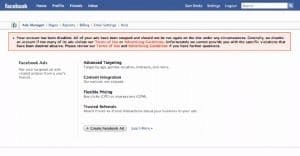 Written by ContentPowered.com
Written by ContentPowered.com
Sometimes, when you submit an ad to Facebook, everything goes smoothly, you get a perfect frequency, your targeting is on point and you pull in an audience with an insanely high conversion rate, you make millions, you retire and live out the rest of your days in a mansion on the beach surrounded by models. Okay, so that has never happened to anyone, but even in comparison, things run smoothly most of the time.
Sometimes, however, you’ll submit an ad only to find a message from Facebook in your inbox telling you that it hasn’t been approved. Uh oh. Now what do you do?
Why Wasn’t Your Ad Approved?
On the surface, it looks like any time your ad is denied, it’s the same situation. However, there are actually two levels of denial; soft and hard.
A soft denial is Facebook telling you that your ad is in violation of some guideline, but only in a minor way. You can follow some simple instructions to fix it and resubmit it, and chances are good it will be approved. When this happens, Facebook sends you an email telling you why your ad was denied and how you can fix it.
A hard denial is worse. Facebook denies your ad but doesn’t tell you why. Specifically, in their help system, they say: “If you don’t see the option to edit your ad, this means that the ad you’ve submitted hasn’t been approved for reasons that won’t allow you to edit the ad and resubmit it for review.” In other words, your ad is too far in violation that it can’t be saved.
For a complete list of why your ad might not have been approved, you need to review the advertising guidelines. In summary, however, you can skim this list and see if any apply to you.
- False Information. If your ad is significantly misleading, deceptive, fraudulent or otherwise factually inaccurate, your ad might be denied. Facebook isn’t going to check all of your product claims for exaggeration, but if you’re claiming a miracle cure for cancer, they’re not going to allow it.
- Multiple Advertisers. If you’re posting ads for multiple advertisers through one account, you’re going to run into issues. It’s easy enough to register new advertising accounts.
- Custom Audience Violations. If you’re in violation of the custom audience terms, your ad can be denied.
- Privacy Violations. If you’re in violation of the privacy and data security rules, Facebook will take strict action. This includes any industry-specific privacy guidelines, like HIPAA in the medical world. It also includes the sale of data; if you’ve been caught selling ad data to other networks, Facebook will lock down your ability to create ads.
- Undue Political or Suggestive Content. Facebook doesn’t like when you go deep into political sensationalism, and they don’t want sexually suggestive content in their ads.
- Demographic Abuse. You can market to all of the Hispanic people who follow you through your demographics, but if you’re using their race specifically in your ad copy, you’re in violation of the Facebook ad rules. The same goes for age, religion, sexual orientation, gender identity, disability, criminal record, trade union membership and anything else personally identifiable.
- Malicious Landing Pages. If Facebook detects malicious code on your landing page, your ad will be denied.
- The 20% Text Rule. If your ad contains more than 20% text you’ll be denied. Sometimes you can get around this with creative text positioning. Sometimes you won’t be able to circumvent it at all.
- Adult, Alcohol, or Sexual Content. Your ads can’t refer to alcohol if they target anyone under the legal age, or in a country where alcohol references are banned. You also cannot promote sexual content, including drugs, videos and live shows. Dating services can advertise, so long as they don’t mention sex.
Sounds like a long list, right? In reality, each of these points may have a dozen variations that can hook your ad and keep you out of the system. These are just the most general rules. You can find some specific examples on Facebook’s page here.
How to Fix the Problem
You have a few steps to take to fix the issue with your ad and get it approved.
First, you need to diagnose why your ad was denied. As you can see from the list above, this can be a bit of a complex undertaking. Thankfully, you can easily rule out a lot of it. If you’re not selling or talking about drugs, alcohol, firearms or adult products, a lot of the possible reasons for denial can be eliminated.
Likewise, if you’ve never sold user data, you’re not using confidential user information and you’re not targeting users inappropriately, you’re in the clear for those violations. All it takes is a quick check of your landing page to make sure it exists and it’s not malicious to solve that issue as well.
The most common reasons for denial are the 20% rule and overly suggestive or inflammatory content. For the 20% rule, you will need to use Facebook’s grid tool to estimate the density of text on your ad image. It’s easy to get around, it’s a dumb rule and it doesn’t catch all text. Just work around it.
As for overly suggested or inflammatory text, it’s something of a subjective determination. Unfortunately, all you can do is tone down the language you use in your ad and resubmit it. Again, Facebook is somewhat inconsistent with enforcement, but you may not want to try to submit the same text again. Just tweak your text, try again and see what you can get through.
When it comes down to it, troubleshooting your denied ads isn’t that difficult. Unless you’re trying to abuse the system – in which case you should accept the denial and then stop using the platform, you’re making it worse for everyone – you just have a minor issue you need to correct. Fix it and you’re good to go.
